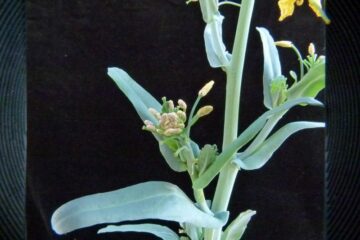'More Cavalier' plants could counter effects of climate change

'To develop varieties of crops that can produce high yield sustainably under changing climatic conditions we need to be able to override plants' natural tendency to batten down the hatches really hard when times are tough, and to hedge their bets when times are good,' said Professor Ottoline Leyser of the University of York.
Professor Leyser was speaking at a recent meeting of the Strategy Advisory Board* of the Biotechnology and Biological Sciences Research Council – the major public funder of plant science research in the UK.
She told the meeting that plants are naturally conservative. Evolution has driven them to plan for the long term and adopt a cautious rate of growth in case things get really bad in the future. While this makes sense in the wild, said Professor Leyser, for crop plants we want varieties that will behave in a more 'cavalier fashion' and maintain a faster rate of growth in a range of environments, investing that growth specifically in plant parts of agricultural relevance.
Although 10,000 years of plant breeding has made significant inroads in modifying plant growth properties, sophisticated new information about plant genes and their functions provides exciting opportunities for plant breeders to tap into the unused potential of plants to maintain productivity, even in harsh conditions.
There is a tendency to assume that plants are growing as fast as they can given the resources available to them, but multiple lines of evidence now show that this is not the case. Plants have specific genes that limit growth, and quite simple changes in those genes can increase productivity. The trick, however, is to breed plants with more sophisticated combinations of these genes that will still respond to the environment, protecting themselves from harsh conditions, but in a more light-touch way. To do that, we need to understand how these genes work together as a system to regulate growth.
Professor Leyser said that one of the big challenges is to channel this information rapidly into large scale plant breeding.
* The Board advises BBSRC Council on its strategic priorities and planning, and brings together academic and industry based researchers.
Media Contact
More Information:
http://www.bbsrc.ac.ukAll latest news from the category: Life Sciences and Chemistry
Articles and reports from the Life Sciences and chemistry area deal with applied and basic research into modern biology, chemistry and human medicine.
Valuable information can be found on a range of life sciences fields including bacteriology, biochemistry, bionics, bioinformatics, biophysics, biotechnology, genetics, geobotany, human biology, marine biology, microbiology, molecular biology, cellular biology, zoology, bioinorganic chemistry, microchemistry and environmental chemistry.
Newest articles

Boron deficiency: oilseed rape reacts as with infection and pest infestation
Genetic mechanisms uncovered… Boron deficiency has a devastating effect on oilseed rape and related plants. However, little is known about the underlying genetic mechanisms. A study shows that the response…

Security vulnerability in browser interface
… allows computer access via graphics card. Researchers at Graz University of Technology were successful with three different side-channel attacks on graphics cards via the WebGPU browser interface. The attacks…

A closer look at mechanochemistry
Ferdi Schüth and his team at the Max Planck Institut für Kohlenforschung in Mülheim/Germany have been studying the phenomena of mechanochemistry for several years. But what actually happens at the…





















